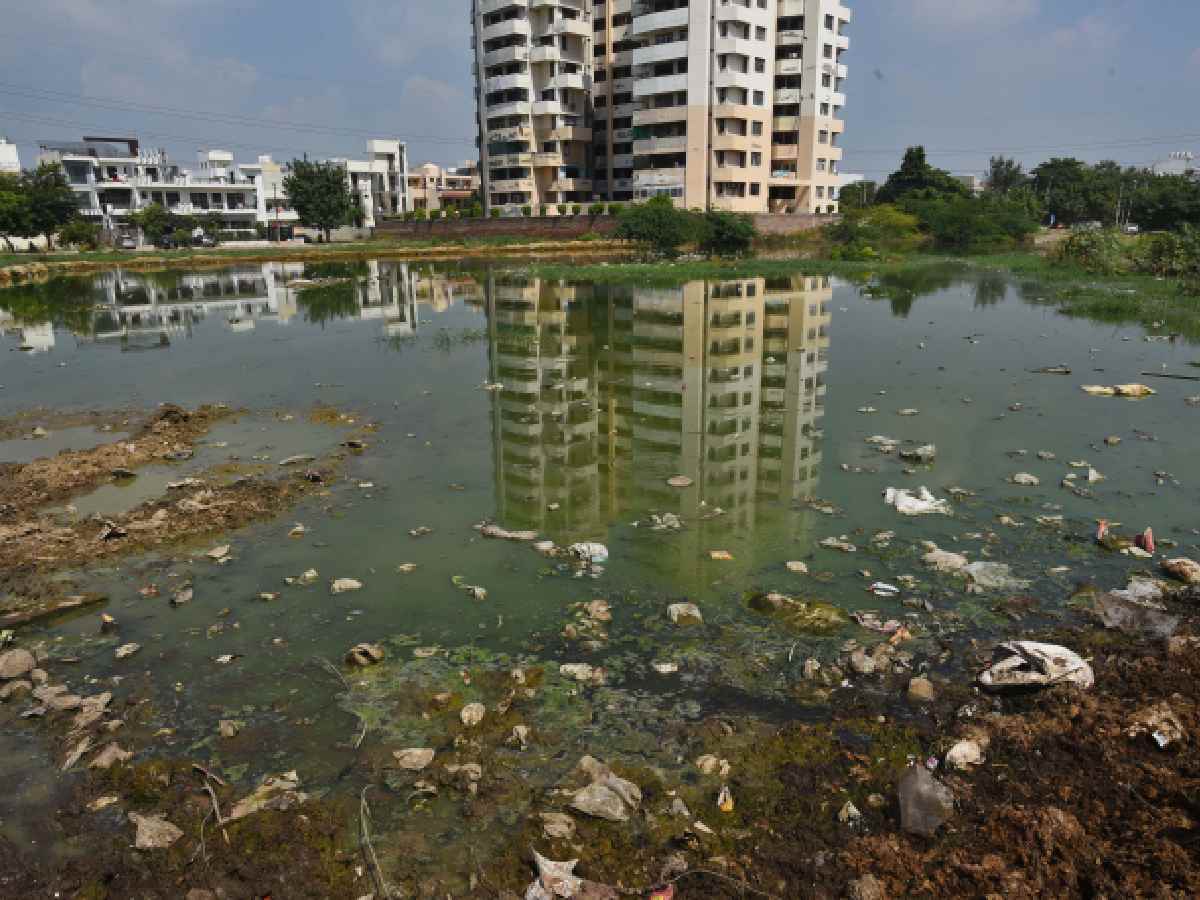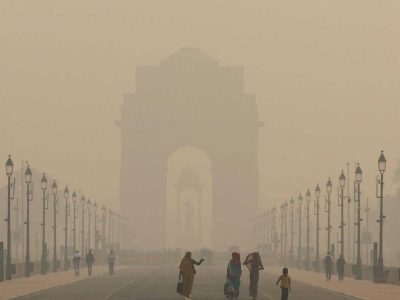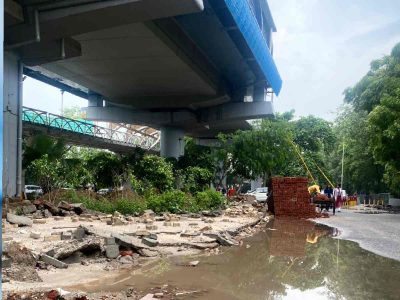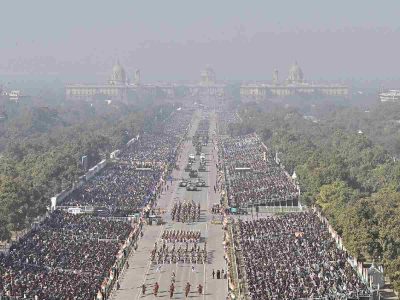by Saurav Gupta/ Kushan Niyogi
Dengue Returns: The total number of vector-borne disease cases surged by more than twofold in the national capital as the city reported 90 cases till June 30 this year, while in 2023 only 43 cases were registered during the same period, as per the data from Municipal Corporation of Delhi (MCD) accessed by Patriot.
Delhi recorded 29 cases of dengue in June, as disclosed by a source. According to official sources, the civic body had record ed only 10 cases in 2023 during the same time frame.
Seven cases were already reported in the city till July 8. Notably, the MCD data only pertains to dengue cases reported at the three MCD hospitals in the city.
Sources said that the total number of dengue cases in the national capital are ought to be much more owing to the cases reported in the seven Central government hospitals and 30 Delhi government hospitals. Presently, the directive from the MCD has only been sent to the three major hospitals under it–Hindu Rao Hospital, Kasturba Hospital and Swami Dayanand Hospital.
The Centre-run Safdarjung Hospital alone reported a total of 102 patients diagnosed of dengue since January this year. On July 8, the facility received a total of six dengue patients, a senior official told Patriot.
The fear of the outbreak of vector-borne diseases looms large over the national capital as monsoon hit the city bringing a much needed respite from the scorching heat, but the failure of multiple agencies increased the risk of mosquito breeding as the Capital registered a steep surge in the water logging hotspots, which currently stand at 308.
The city hospitals are gearing up to handle any medical exigency like in year 2015 when more than 60 people succumbed to disease and about 16,000 cases were reported in Delhi.
Hospitals Run By MCD
The Municipal Corporation of Delhi (MCD) has issued directives for hospitals run by the civic body in the state regarding the preparedness for vector-borne diseases.
According to a senior MCD official, the corporation is ensuring that the work of sanitation is carried out at every health facility to keep the premises free from mosquito breeding.
He said that nodal officers for Vector Borne Diseases (VBD) are designated in all hospitals.
Also Read: Delhi: Displaced Yamuna farmers scramble for shelter
Informing about the beds, he said, “70 beds in Hindu Rao Hospital, 75 beds in Kasturba Hospital and 22 beds in Swami Dayanand Hospital are reserved for the patients suffering from VBDs. In the situation of increase in the number of patient admissions, hospitals are prepared to add more beds”.
“Additionally, mosquito nets are available in sufficient numbers in these hospitals which are designated as sentinel hospitals of MCD,” a senior official added.
He said that fever clinics have already been started in all hospitals and peripheral health centres.
“Testing kits for malaria and dengue are adequately stocked and distributed. Stock position of diagnostic kits, medicines, IV Fluids (Hospitals) is being monitored at all levels. A 24-hour blood bank facility is available and there is no issue regarding the availability of blood components at present,” a senior MCD official added.
Lok Nayak Hospital (LNJP Hospital)
Speaking to Patriot, Dr Ritu Saxena, Deputy Medical Superintendent (DMS), Head of Department of Accident and Emergency at LNJP Hospital, said, “Since the major outbreak of the dengue back in 2015, the hospital is always fully equipped and ready to handle den gue patients. The facility has a 70-bedded disaster ward which is solely made for handling any kind of medical exigency.
“Apart from this, 24 beds are available in the casualty ward at the facility,” she said.
“On the other hand, all the necessary medication supplies and stocks are available including the rapid antigen kit to test the patients for dengue. The fever ward also contains mosquito net for the prevention of the disease,” she said.
Informing about the preventive measures, Dr Ritu said, “The hospital is taking all the preventive measures in order to contain the spread of the vector-borne diseases within the premises including getting the campus regularly checked for the mosquito breeding sites and hotspots of stagnant water by the authorities concerned – Public Works Department (PWD) and Municipal Corporation of Delhi (MCD)”.
“As far as the doctors and medical staff are concerned, they were briefed regarding the disease on a regular basis to train them for handling any kind of situation and deal with the patients on a daily basis,” she said.
“Additionally, LNJP’s blood bank is actively conducting blood donation campaigns,” added Dr Ritu.
Sir Ganga Ram Hospital
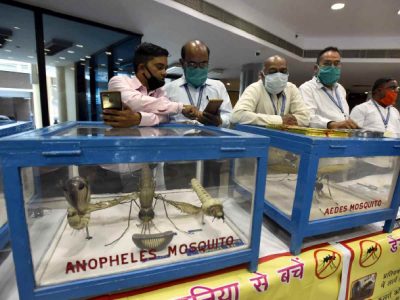
about vector-borne diseases
Dr Atul Kakar, Chairman, Department of Internal Medicine, Sir Ganga Ram Hospital said, “As Indians, we are hyper-aware of dengue since it’s been raining heavily. The timing of this is also known by doctors in the country.
“Currently we have 36 beds ready at the main building, out of which 12 are in emergency ward, 12 in the casualty and 12 in a special ward which can be turned into the dengue ward. Additionally, we have two more buildings of the hospital — Sir Ganga Ram City Hospital and Sir Ganga Ram Kolmet Hospital which have 100 and 30 beds respectively to tackle any medical emergency,” informed the doctor.
“The doctors are physically and mentally prepared to handle the vector-borne disease patients. Any patient coming to the OPD or casualty with fever, headache, body aches, rashes or low platelet count should be investigated for dengue. We have an infection control system and a reporting system for any dengue cases to notify the health authorities,” he said.
“We do not allow any water-logging on the hospital premises. Each and every pothole is filled so that there is no standing water which can be the source of mosquito breeding. All the patients of dengue are isolated and protected with cloth mesh which helps in isolating the patients. During the dengue season, hospital authorities have beds in emergency wards reserved for dengue cases, and one of the wards is converted into a dengue ward,” Dr Kakar emphasised.
“Apart from this, the blood banks are also made aware of the requirement of platelet transfusion in case any of the patients have severe dengue or bleeding,” he added.
Delhi Government
On June 8, Delhi Health Minister Saurabh Bharadwaj convened a high-level meeting to tackle dengue and malaria.
During the meeting, officials of hospitals informed that separate arrangements have been made for dengue patients.
They informed that some beds have been reserved separately for dengue patients, where only dengue and malaria patients will be kept, so that they can be treated in a better way. This is also to ensure that those diseases do not spread to other patients.
The hospital administration also informed that to prevent the spread of these diseases, a net has also been arranged around the beds of patients, so that no mosquito bites those patients and spreads dengue and malaria to any other patient and these serious diseases can be prevented.
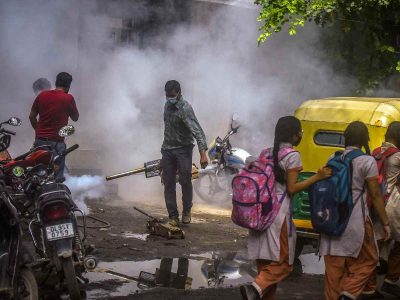
Bharadwaj also issued instructions to the department officials to run awareness campaigns to identify the symptoms of dengue and malaria and to prevent it.
The Health Minister directed all hospitals to arrange separate rooms and beds for patients suffering from diseases like dengue and malaria, and at the same time, issued instructions to provide immediate treatment to patients coming to the hospital.
The Minister instructed the Medical Superintendents (MS) and Medical Directors (MD) of all hospitals and said that patients coming to the hospital with symptoms of dengue and malaria should be examined immediately and if the report is positive, the patient should be given immediate treatment so that their life can be saved.
Challan Amount Should Be Increased
According to a senior health official of MCD, the proposal to increase the amount of challan which is currently Rs 500 for the violation of the mosquito breeding norms is still pending for the approval of Delhi government for the past three years.
“This can help in containing the mosquito breeding sites in the national capital as despite several legal notices and challans, some people do not follow the norms. This might also be due to very minimal challan amount which they had to pay following which they choose to neglect the guidelines,” he asserted.
Expert Take
Dr Jugal Kishor, Director and Professor of Community Medicine, Safdarjung Hospital, said, “The spread of the vector borne disease can only be con trolled by creating awareness regarding the breeding of Aedes mosquitos as there is no specific anti-viral drug which can be given to patients following which the situation gets out of hands of medical professional in case of dengue. The vaccine is also still under trial.

